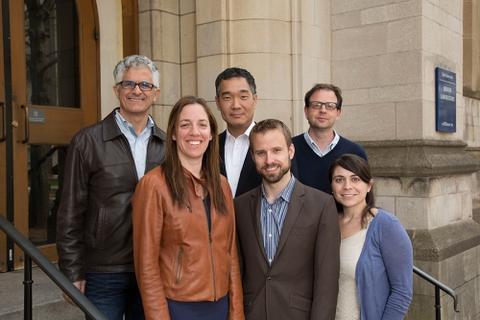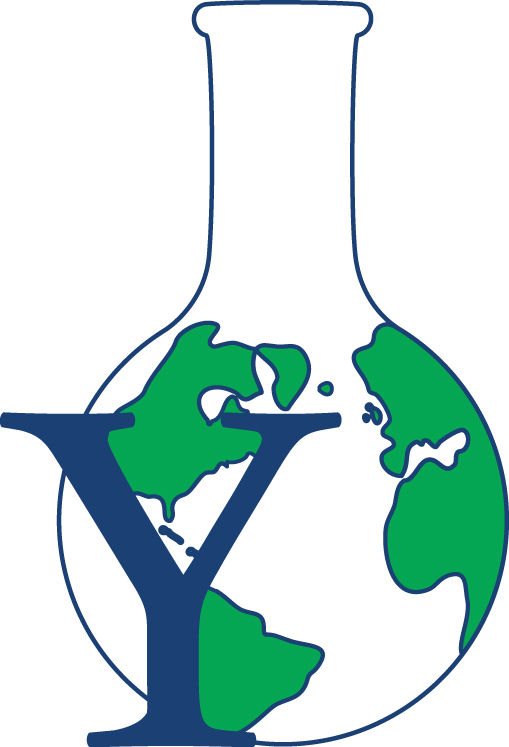
Pictured: The Environmental Engineering faculty (from left to right): Menachem Elimelech, Julie Zimmerman, Jaehong Kim, Drew Gentner, Jordan Peccia, and Desiree Plata.
With cutting-edge research and internationally recognized faculty, Environmental Engineering at Yale has established itself in just a few years as a powerhouse in the field.
Its achievements are reflected in the 2017 U.S. News & World Report’s Graduate Engineering Rankings, which lists the program at No. 9. in the category of “environmental engineering.” Yale’s program is tied with those from MIT and Johns Hopkins University.
The program, which emphasizes a multidisciplinary approach to solving environmental problems, allows graduate students to pursue their educational and research interests across departmental lines and draw upon the resources of other departments and schools at Yale. Several faculty members also have close ties with the School of Forestry & Environmental Science.
Menachem Elimelech, the founder of the environmental engineering program, attributed the program’s success to the dedication of the faculty.
“I really believe that people make the difference,” said Elimelech, the Roberto C. Goizueta Professor of Chemical & Environmental Engineering. “We have active faculty who are carrying out high impact research in their field, playing leadership roles in the environmental engineering profession, and receiving important awards in recognition of their research.”
Equally important, he said, are the many outstanding graduate students and postdocs who have gone through the program.
“The vast majority of them - nearly 60 - are holding faculty positions in leading universities in the U.S. and abroad,” Elimelech said, adding that these placements “range from Harvard on the east coast to the University of California, Berkeley on the west coast.” “I believe there is a strong correlation between the ranking of a graduate program in engineering or science and the ability of the program to place their graduates in faculty positions.”
Grad students and postdocs have also taken positions in government and industry, including those at the U.S. Environmental Protection Agency, Proctor & Gamble, the Boston Consulting Group, the U.S. Department of State, and the World Health Organization. Numerous graduate students have also received prestigious fellowships from the National Science Foundation and the Environmental Protection Agency.
Environmental Engineering at Yale began in 1998 as an interdisciplinary program within the Department of Chemical Engineering, built upon institutional strengths in environmental, biological, and engineering sciences and guided by Yale’s global perspective. To more accurately reflect the scope of the research and the degree offerings, the Department of Chemical Engineering was renamed in 2010 as the Department of Chemical & Environmental Engineering.
Several of the program’s faculty members play a key role in the Nanotechnology Enabled Water Treatment Systems center (NEWT), an effort that brings together partners from industry, government and other universities to provide clean water to millions of people and make U.S. energy production more sustainable and cost-effective. NEWT, which began last year, is funded with an $18.5 million grant from the National Science Foundation (NSF).
The environmental engineering program has produced research that has helped shape public discussion on some of the most important environmental issues today. These include water desalination and wastewater reuse; the impact of energy production and use on air quality and climate change; the environmental implications of the use of engineered nanomaterials; and sources of human exposure to bacteria and fungi in buildings and other man-made surroundings.
The impressive ranking from U.S. News & World Report is just the latest honor for the program, which includes a faculty member named to the National Academy of Engineering, a Clark Prize and Eni Award winner, three winners of the Walter Huber Civil Engineering Research Prize, and a recent National Science Foundation CAREER Award. Several faculty members also serve as editors or on editorial boards of leading journals in the field of environmental engineering.
Reflecting the program’s expansion, Environmental Engineering will soon be moving into a new, higher quality space. And with the continued support of Yale, Elimelech said, the program will continue to grow in stature and excellence.
“We hope to continue with our impactful, collaborative, and relevant research in environmental engineering,” he said. “We have hired a few outstanding young faculty in the past few years and I believe their research will make an impact in the coming years, and will further enhance the reputation and visibility of the environmental engineering program.”
